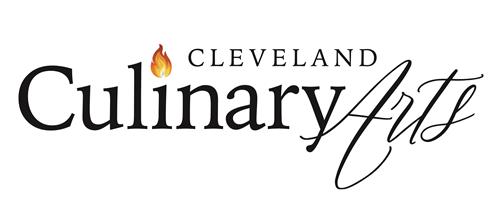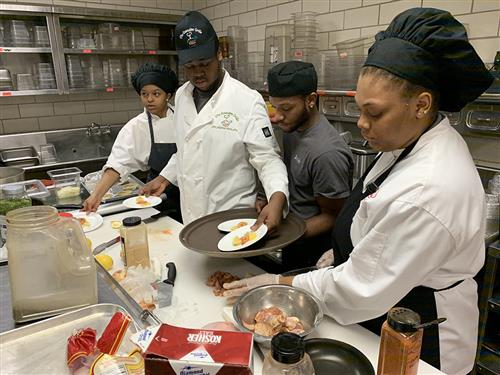- The Executive Grille
- Hospitality and Tourism Career Field Pathways
-


Hospitality Fundamentals
This first course in the career field will introduce students to culinary arts, foodservice operations, lodging, travel and tourism. Students will obtain knowledge of customer service principles and examine the impact of cultural, historical, social and technological developments on key segments of the industry. They will also apply safety and sanitation techniques to prevent and control injuries, illnesses and diseases in the workplace. Business law, employability skills, leadership and communications will be addressed.
Fundamentals of Food Production
Students will prepare food products and beverages according to standardized recipes. They will apply plating and presentation principles to deliver attractive menu items, establish food specifications and prep lists, and develop ingredient and portion control guides. Safety and sanitation, standard knife skills, and culinary math will be emphasized. Employability skills, leadership and communications will also be incorporated.
Contemporary Cuisine
Students will prepare regional and international food products and beverages according to standardized recipes. They will research and develop marketable new recipes, plan and design menus, and calculate food requirements and costs. Selection, use, maintenance and storage of commercial equipment, machines, tools and tableware will be emphasized. Food science, inventory management, food presentation, and safety and sanitation will also be addressed.
Dining Room Service and Operations
Students will apply strategies and techniques to identify and meet dining guest needs. They will provide table and beverage service; maintain eating areas, meeting spaces and serving stations; manage online reservations and orders; and monitor table turns, wait lines and table assignments. Nutritional analysis, types of table service, safety and sanitation, cultural intelligence, employability skills and communications will also be addressed.
Restaurant Management
Students will apply management principles to plan, organize and direct restaurant staff toward goal achievement. They will hire, train, and supervise employees; establish processes to facilitate restaurant operations; and plan and design menus. Students will also forecast and schedule food production, establish food specifications, select vendors, calculate costs, and purchase food and nonfood products. Other topics include food science, nutritional analysis, business law and ethics, economics and marketing.
Baking and Pastry Arts
Students will apply food-science principles to prepare and bake breads, desserts and pastries. They will also use specialized decorating and presentation techniques to decorate cakes, cookies, pastries, and other baked goods. Students will select quality ingredients, determine food costs, and research and develop marketable new recipes and food concepts. Personal safety, food safety, and equipment safety will be emphasized.
Hospitality and Tourism Capstone
The capstone course provides opportunities for students to apply knowledge, attitudes and skills that were learned in the program in a more comprehensive and authentic way. Capstones often include project/problem based learning opportunities that occur both in and away from school. Under supervision of the school and through community partnerships, students may combine classroom learning with work experience. This course can be delivered through a variety of delivery methods including cooperative education or apprenticeship.
Catering and Banquet Service Operations
Students will design and manage catering and banquet operations. They will recommend types of food functions and food-and-beverage services to clients, create menus for special occasions and events, and determine financial requirements. Students will hire, train, and supervise staff; manage event logistics, operations and service providers; and oversee dining room operations. Customer service; food, equipment and site safety; and high-volume food production will also be addressed.
